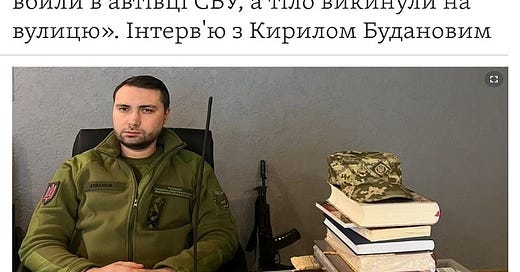Kiev’s Military Intel Chief Told US State-Run Media That The SBU Killed One Of His Top Men
Kiev’s incumbent military intel chief literally just implied to US state-run media that suspected Russian agents remain within the ranks of his fascist regime’s secret police despite having assassinated a Ukrainian “hero” nearly a year ago, which thus brings Zelensky’s public relations crisis from the past week to an unprecedentedly critical point that risks further delegitimizing his rule at home and abroad.
The infighting within Kiev’s fascist regime that Zelensky’s former advisor Alexei Arestovich recently revealed in an interview is spiraling out of control and breaking open into the public. On the same day as the Daily Mail dropped its bombshell report that the “Foreign Legion’s” spokeswoman is blackmailing senior military leadership, it turns out that US state-run Radio Free Europe/Radio Liberty (RFERL) interviewed Kiev’s military intel chief who told them that the SBU killed one of his top men last March.
The interview with Kiril Budanov in its original Ukrainian can be read in full on their official site here for those knee-jerk skeptics who doubt that any such thing just transpired, while the English summary that came out the day later can be read here. Budanov was approached by RFERL a few days after the Wall Street Journal (WSJ) reported that businessman Denis Kireev was not only assassinated by the SBU, but that he’d been working closely Ukrainian military intelligence agency GUR at the time that he was killed.
Furthermore, that leading Mainstream Media (MSM) outlet also claimed that Kireev was instrumental in passing along information right before Russia’s special operation that was supposedly responsible for improving the capital’s defenses at that crucial time in this conflict. He was thus accordingly described by the WSJ as a “hero” and Zelensky himself allegedly awarded him a posthumous honor due to his unparalleled contribution in helping the Ukrainian cause.
Budanov agreed that Kireev was a “hero” and added that his role in participating in the Minsk peace process was “to prolong the process in order to buy time”, revealing that his full-time employee was supposed to depart for the Belarusian capital by train before being called to the SBU headquarters where he was ultimately intercepted by its counterintelligence agents and assassinated. The GUR chief then spiced everything up by sharing what he admitted was his “subjective opinion”.
According to him, “whoever did this on purpose had the goal of preventing us from interfering in someone else's game and delaying this process in order to allow our Armed Forces, let's say, to take certain actions to repel the enemy. If you remember those events, then the situation was close to critical. I think you should remember it well. And there was a certain number of people who, let's say, did not really want Ukraine to win.”
What’s even juicier about his theory is that he earlier revealed that he knows exactly who assassinated one of his top men and confirmed that they still work with the SBU. Putting two and two together, Kiev’s incumbent military intel chief thus just implied to US state-run media that suspected Russian agents remain within the ranks of his fascist regime’s secret police despite having assassinated a Ukrainian “hero” nearly a year ago.
The narrative consequences of this public claim from one of that regime’s most powerful figures are literally unprecedented since this is the first time that a senior security official said such a thing. Furthermore, this is taking place against the backdrop of Kiev’s worst public relations crisis after American and Polish officials coordinated their efforts to decisively shift the “official narrative” about the conflict from one of Kiev’s “inevitable victory” to seriously warning about its likely loss.
Just a few days after Daily Mail’s report about how the “Foreign Legion’s” spokeswoman is blackmailing top military brass and RFERL’s interview with Budanov both confirmed how serious Kiev’s infighting has gotten, Zelensky announced a so-called “reshuffling” of ministry, regional, and security officials and banned them all from traveling abroad except on official business trips. Quite clearly, he’s attempting to carry out a purge on anti-corruption or other pretexts in an effort to retain power amidst this infighting.
The details about the latest dynamics remain difficult to discern considering his fascist regime’s infamous opacity, but objective observers can thus now confidently conclude that Arestovich was indeed correct in warning about the vicious infighting afflicting Kiev’s leadership. The GUR turned against the SBU as proven by what Budanov just scandalously implied to state-run RFERL, while the SBU appears to have its own myriad divisions as suggested by the Daily Mail’s latest report.
All the while, Ukrainian information warfare agents like Ilya Ponomarenko are breaking all prior taboos by implying that Zelensky and his team are delusional about their latest defeat in Soledar, revealing how difficult the military situation is at the front, and condemning its command and control. Taken together, these three developments – the Daily Mail’s report, Budanov’s RFERL interview, and Ponomarenko’s scathing article – very strongly suggests that the regime’s anti-Zelensky forces are on the offensive.
Nobody should believe that all three of them dropping their respective anti-Zelensky information warfare products on the exact same day, 22 January, was a coincidence either. They obviously coordinated their efforts in the aftermath of American and Polish officials joining forces to decisively shift the “official narrative” about the conflict that Zelensky continued to delusionally cling to for politically self-interested reasons, thereby twisting the knife at his weakest public relations point.
This explains why the embattled leader, who’s now facing internal resistance like never before, just panicked by declaring a far-reaching reshuffling of the Ukrainian leadership across the ministry, regional, and security levels. It’s too early to predict what’ll come next, but no one should doubt that Arestovich told the truth over the weekend when informing the world about how vicious Kiev’s infighting has recently become, which could lead to unpredictable consequences if the situation doesn’t soon stabilize.




